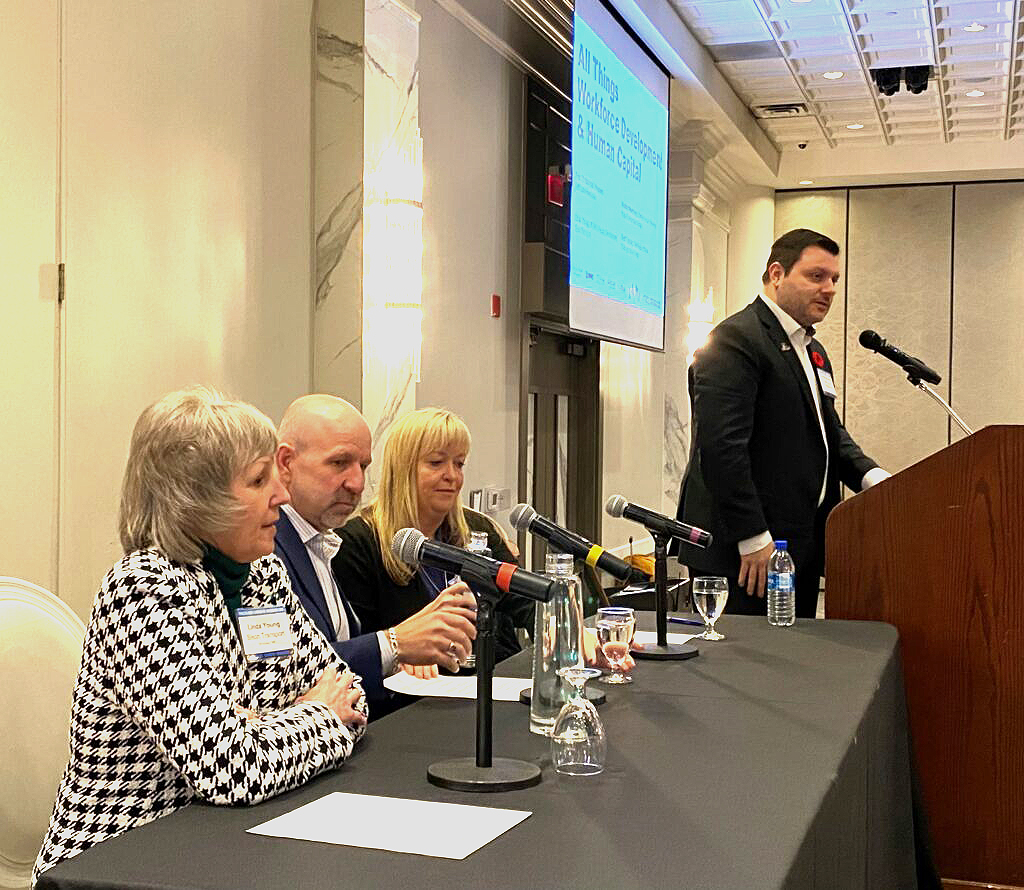Industry slowdown not the time to ease up on HR initiatives: panel
Freight markets have slowed, but several senior trucking executives stress that it’s the time for fleets to be more strategic and selective in hiring practices rather than taking their eyes of HR programs.
Talent development and succession planning come to the forefront when there is less urgency to fill seats than there has been in the hyper-competitive hiring market of the past couple years, said Linda Young, vice-president of HR and people development at Bison Transport.
She was speaking as part of a panel at the Truckload Carriers Association’s annual Bridging Border Barriers event in Mississauga, Ont., and said Bison continues to seek talent and go after individuals who may be seeking greater stability in an uncertain market.

“There may be resources out there that are affected by the freight recession, that are looking to get into a stable organization or make a career move,” Young said.
Geoff Topping, chief people officer at Challenger Motor Freight, said a slowdown also enables a fleet to be more selective about who it hires. This may mean leaving vacated positions open longer before filling them or focusing on building a talent pipeline even if there are no positions currently open.
“You can be more strategic and put more thought into how and when to hire, rather than just hurry up and hire,” Topping said.
And the benefit of a slow market means drivers are less likely to leave, added Heather Mewhinney, director of human resources with Kriska Transportation Group.
Turnover non-existent
“A year ago, it was a job-seeker’s market. If you were looking for a job, you had your choice and were likely able to leave an organization for more money or a different opportunity,” she said. “That has changed. Turnover has decreased to almost nothing. It’s not a market where people want to leave. We don’t have to do the level of hiring we did a year ago, but it’s a great opportunity to say ‘Do I have the right team?’”
Speaking later in the day, Kriska CEO Mark Seymour said the company is focused more on right-sizing the fleets within its organization.
“Right now, we don’t need more drivers,” he said. “As we sit here today, we don’t need more drivers. We need more good work, more good partnerships, more commitment, better pay terms, more respect. Not more drivers, not more trucks.”
One thing that remains constant during market downturns, however, is that employees continue to age. Topping said succession planning should continue even during a slowdown.
“We need to make sure we are addressing the aging workforce,” he said. “We have to ensure we have a pipeline of people coming into the industry and into all of our companies in different roles.”
Succession planning
Challenger’s approach to succession planning involves everything from train-the-trainer workshops, to providing adult learning opportunities for employees looking to change roles. Topping also likes to offer ‘stretch projects’ to employees with high potential.
“Let them learn another side of the business and expand their knowledge,” he suggested.
Succession planning is a top priority at Bison as well, Young added. That company has an Expression of Interest program that allows employees to indicate where within the company they’d like to take their career, and then map out a way to get there. That’s in addition to programs for new graduates and aspiring sales reps or mechanics. Challenger has a learning academy it developed in house, consisting of nine learning modules that help prepare an employee for a new role with greater responsibilities.
Smaller companies without robust HR departments may rely more on free tools or resources during lean times. Mewhinney lists Trucking HR Canada, trucking associations, industry peers and tools like HRDownloads as great resources. Regulatory changes impacting employers have ramped up and aren’t always easy to understand.
“There’s a lot of complexity to some of the new acts that have been put into place,” Young said, adding “if you don’t have HR, you better hire a good lawyer.”
Mewhinney feels increasing government regulation will be one of the biggest HR challenges looming in the year ahead. Canada’s Labour Code sat relatively unchanged for nearly 25 years and is now undergoing major revisions related to issues such as pay equity.
Legislative changes
“The last three years, we are seeing more changes than ever before,” she said.
Even employers that already comply with new regulations, such as those concerning pay equity, have plenty of work to do to ensure policies meet with the precise requirements of the legislation.
“The work required to be able to prove that [compliance] and show what the government is asking of us is a tremendous undertaking,” Mewhinney said of looming pay equity legislation.
Merger and acquisition activity also doesn’t slow during industry downturns, and Mewhinney said HR should be involved as early in the process of an acquisition as possible.
“So much goes into looking at the financial performance of an organization,” she said, “there has to be an HR component as well.”
HR leaders can help determine if the cultures of the buyer and seller align, and familiarize themselves with the seller’s existing HR policies. When a transaction is announced, Topping said it’s important to communicate with employees of the acquired company, and in various forms.
“Some want email, some want messages on TVs in the building,” he said.
Young said HR should also be mindful to preserve ingredients within the purchased company’s culture that made it successful in the first place.
Have your say
This is a moderated forum. Comments will no longer be published unless they are accompanied by a first and last name and a verifiable email address. (Today's Trucking will not publish or share the email address.) Profane language and content deemed to be libelous, racist, or threatening in nature will not be published under any circumstances.